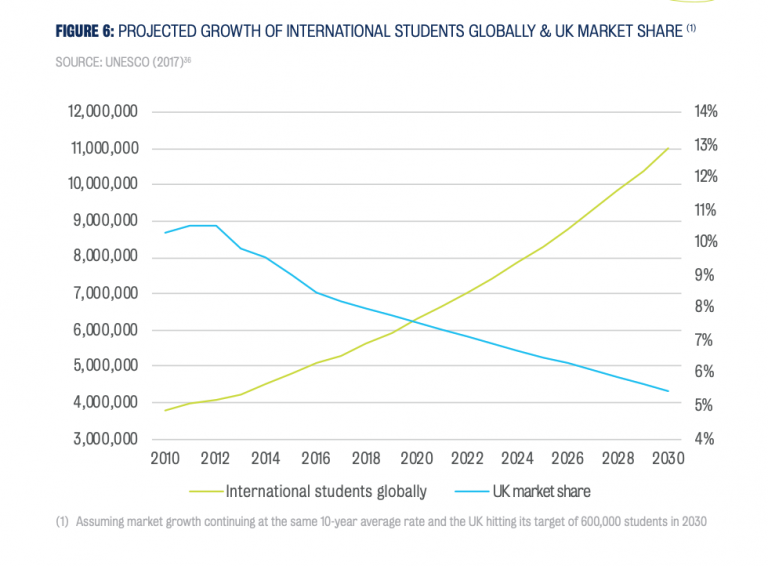As the Education and Universities Ministers of the four countries of the United Kingdom (UK), England, Scotland, Wales and Northern Ireland, we are proud that so many international students choose to study here each year. We are also aware that as thousands of students like you from around the world would usually be considering their next steps, a global pandemic has caused huge disruption to our daily lives.
We want new international students to benefit, as current students do, from a worldclass education from our globally renowned universities and enjoy an unforgettable UK student experience. For this reason, we have worked closely with our universities and are pleased to inform you that they have made, and will continue to make, every effort to enable you to study in the UK next academic year and beyond.
The UK has a highly tolerant, multicultural society, with a rich diversity of cultures, languages, and faiths. International students contribute significantly to this enriching environment – which makes the UK such a brilliant place to study. Our universities consistently do their utmost to ensure international students feel welcome on campuses and beyond; they are clear that everyone with the talent and potential to succeed in higher education has the opportunity to do so, regardless of nationality, ethnic or national origins.
Recruitment for 2020/21 is happening now and our universities are very much looking forward to welcoming you.
UK higher education has a well-established reputation for high quality – our universities are among the best in the world. There are 4 UK providers amongst the top 10 in the world, and 18 providers in the top 100. Our universities also have a outstanding reputation for world-class research, which has been showcased during this global pandemic as many are at the forefront of global efforts to understand the
coronavirus, provide specialist equipment and combat COVID-19.
Our graduates are proven to be among the most desirable in the world. Over 50 serving world leaders have benefited from a British education, and 83% of international graduates surveyed by Universities UK International (UUKi) said their UK degree helped them get their job. A UK education opens doors, wherever you go in the world.
The new Graduate route represents a significant improvement in our offer to international students that will enable you to work, or look for work in the UK, at any skill level for two years after graduation.
The Graduate route will be available to international students who successfully complete their degree at undergraduate level or above at a UK Higher Education Provider with a track record of compliance by summer 2021, or after. International students present in the UK before 6 April 2021 will still be eligible for the two year Graduate route, if you meet the other requirements of the route, even if you begin your course online before travelling to the UK in person. This is a fantastic opportunity for international students that will help you with your first steps into employment after graduation. More information about the Graduate route is available online: https://homeofficemedia.blog.gov.uk/2019/10/14/fact-sheet-graduateimmigration-route/
We are working to ensure that existing processes are as flexible as possible, so that international students who are planning to study in the UK can do so.
We recognise that embarking on a course of study at a UK higher education institution is a significant commitment, which is why we want to reassure international students who are considering study in the UK that they will be able to apply for, and will receive, their Tier 4 visas in good time before commencing their programme of study in the UK.
Despite some COVID-19 disruptions to visa processes and exam timetables, you can still get started with the process. For example, you can familiarise yourself with UK visa requirements and talk to your chosen universities about evidence you may need to supply for a visa application.
We continue to monitor worldwide border, travel and public health restrictions and are resuming normal services as soon as we are able. Some Visa Application Centres have reopened, with more to follow over the coming weeks. We recognise the importance of international students, and as local restrictions lift, and application centres begin to reopen we will look to process applications as quickly as possible.
UK degrees are of a globally high standard and are internationally valuable whatever form they take – whether they are delivered in person or have elements online.
Although admissions processes and modes of teaching might look slightly different this year, the UK’s world-class universities are continuing to recruit international students and you are encouraged to apply even if you are unable to travel to the UK to meet usual timelines. Universities will be flexible in accommodating your circumstances where possible, including if you are unable to travel to the UK in time for the start of the academic year. We have seen some fantastic and innovative examples of high-quality online learning being delivered by institutions across the UK, and the sector is already working hard to prepare learning materials for the summer and autumn terms. If you have any questions about course delivery in 2020/21, we encourage you to contact your chosen or prospective universities – who
are best placed to provide you with institution specific information.
The UK Government, which is responsible for higher education in England, has worked closely with the Office for Students, the independent higher education regulator in England, to ensure students are able to continue their studies, receive good quality provision and work towards a degree that they and future employers value. The Office for Students has, released advice which confirms that it will continue to regulate all registered providers in England, regardless of whether their current provision is online or not. In Scotland, the Scottish Funding Council is working closely with the Quality Assurance Agency and Education Scotland to monitor the quality of the student experience. The Higher Education Funding Council for Wales, as the regulator for higher education in Wales, has similarly published a circular which reaffirms its expectations that providers will continue to meet their obligations for quality and standards. This should provide you with the assurance that the quality of a UK qualification will continue to be internationally valuable whether delivered face-to-face or online or in blended form. A recent survey of UK Universities found that 97% of universities surveyed are planning to provide some form of in-person teaching (in small groups) at the start of term, with 87% stating they will offer in-person social opportunities.
The UK cares immensely about the health and wellbeing of international students, and ensuring they are safe is our number one priority.
We would like to reassure you that all governments across the UK are adhering closely to the most up to date scientific advice and guidance, which is available publicly online. As this changes, our advice has, and will continue to change to match the level of the threat of the virus.
To keep number of transmissions in the UK as low as possible, and to protect UK residents and international students in the UK, all international arrivals are now required to supply their contact and accommodation information and self-isolate in their accommodation for fourteen days on arrival into the UK. We have been clear that universities are responsible for, and must support their students on arrival to the UK. We are proud that UK universities are already demonstrating how seriously they are taking this responsibility, in ensuring that their students are safe and well cared for both upon arrival and for the duration of their stay.
These measures will be reviewed regularly, to ensure they are in line with the latest scientific evidence and remain effective and necessary. International students should not worry – we are working with universities to ensure that you know what to expect before you travel to the UK and are welcomed and supported on arrival by your chosen university.
It is now also a legal requirement to wear a face covering on public transport in England and from 22 June will also be mandatory in Scotland, and across the UK you are encouraged to wear a face covering in other enclosed public spaces where social distancing is not possible and where you will come into contact with people you do not normally meet. The UK government has published the essential health and safety requirements that apply to Personal Protective Equipment (PPE) used in the UK, and clear guidance on appropriate PPE, which is consistent with World Health Organization guidance for protecting from COVID-19. Further information on this, and staying safe outside your home can be found online: https://www.gov.uk/government/publications/staying-safe-outside-your-home/staying-safe-outside-your-home
The UK is immensely proud of its amazing National Health Service (NHS). From the very start of the pandemic we have been clear that our priority is to safeguard the health, safety and wellbeing of all students – including international students – in the UK. In addition to support from their universities, NHS services are available to both domestic and international students. International students will always be able to access treatment that clinicians consider is immediately necessary or urgent at no upfront cost. No charges apply to testing for coronavirus, and as an international student in the UK, you will also be able to access specific COVID-19 advice through a new COVID-19 online service www.111.nhs.uk/covid-19.
UK should double duration of PSW visa to recover HE sector – former minister
The UK’s former universities minister, Jo Johnson, has recommended doubling the duration of the post-study work visa from two to four years among a range of measures that would help the UK higher education sector overcome the shocks of Covid-19 and Brexit.
He also wants the UK to double the number of Indian students the country attracts by 2024.
In a report published by the Policy Institute at King’s College London and the Harvard Kennedy School, Johnson warned that the anticipated 50-75% drop in international students as a result of coronavirus would expose “real vulnerabilities” in university finances.
The brother of prime minister Boris Johnson said universities have long been tied down by “bureaucracy, obsessions with poorly-crafted immigration targets and petty rules”, pointing out that the UK’s international student numbers rose by just 0.3% in 2016 and 0.9% in 2017.
To overcome this, Johnson recommends that the government recommit to existing 2030 exports targets outlined in the International Education Strategy – and create an additional goal for the UK to be the number one study destination worldwide after the US.
“For many years, the top three destinations for international students have been the United States, the United Kingdom and Australia. But recently global student mobility has begun to shift,” he wrote in the report.
“The UK’s market share declined in 17 out of the world’s 21 top sending countries between 2010 and 2017.
“By contrast, Australia has now seen steady year-on-year growth of around 14% and might soon catch up with the UK in terms of total overseas numbers if it has not done so already.”

Source: Universities open to the world report
To maintain its foothold as a top student destination, Johnson said that it is vital to send a clear signal that Britain is open and welcome, with a “best-in-class student visa offer”.
To achieve this, he said, the government should “turbocharge” the competitiveness of the UK visa offer with the doubling of post-study work visas from two to four years.
He also suggested that the UK should seek to rebalance its mix of international students coming by doubling Indian student numbers by 2024.
Johnson acknowledged that the UK has made strides in appealing to Indian students after a steep decline following the removal of the PSW visa in 2012.
The government should take heed of the fact that the number of Tier 4 study visas for Indian students increased 136% to almost 50,000 in the year to March 2020, he counselled.
He added that reversing the Home Office’s “continued and deeply unpopular” exclusion of India from its low-risk Tier 4 visa list – which allows students from China and certain other countries a streamlined visa process – should also be a priority.
“The UK is in a good position to take market share from the US in India and a further improvement in the post-study work offer would help the sector overcome new concerns about studying in the UK that have arisen in the wake of Covid-19,” he said.
“A Tier 4 visa that promises four years of post-study work rights will be of huge advantage to the UK in India, where students are particularly sensitive to this opportunity.”
Among his other recommendations, Johnson – who was appointed chairman of the advisory board to ApplyBoard in February – also wants to re-focus the British Council on education promotion and build a StudyUK alumni network to “leverage its international alumni”.
“International education is one of the UK’s few globally competitive sectors,” said Johnson in a statement.
“The moment has come to ensure that the UK’s great universities can play their full part in this next chapter of Britain’s engagement with the world beyond its shores.”
When asked if the UK was too reliant on China, in an interview with BBC Radio 4, he commented that beyond a focus on India, “I recommend we increase significantly the number of students from other key countries such as Nigeria and Malaysia to rebalance the mix.”
Asked if brother Boris was receptive to Johnson’s agenda, he replied, “He’s a strong supporter of international students and always has been.
“He’s got the report. He’s received it. And, you know, I’m sure he’ll be getting round to reading it as and when he has a chance.”
Laura Rettie, vice president of global communications at education consultancy Studee commented: “Brexit and now the pandemic has been the perfect storm, plunging many [universities] to the brink of collapse.
“The government must offer support to keep them afloat – time is of the essence as UK universities slide further down the rankings.”
UK confirms post-study work stands if onshore by April 2021
The UK Home Office has confirmed that international students will remain eligible for post-study work rights upon graduation if they begin or continue their studies online in the 2020/21 academic year.

The news will be welcomed by those working in universities and key stakeholders advocating for the UK to come out fighting to maintain its market share of international students.
International students will still be eligible to access the graduate immigration route as long as they are in the UK by April 6 and complete the final semester of their studies in the UK.
“If students are required to either continue their current studies or commence a new course by distance or blended learning due to Covid-19, they will still be eligible to switch into the Graduate route on a concessionary basis if they spent some time studying outside the UK,” states the guidance.
Among those calling for clarity were sector bodies UUKi, UKCISA and BUILA, which had outlined a series of measures required to “kickstart the recovery” of the sector.
These included ensuring online study does not disqualify students from Graduate Route: “students who study part of their course online and spend less than 11 months in the UK as a result, should not miss out on the Graduate Route”, said the position paper.
The graduate route was announced in September 2019, planned to come on stream as the UK adjusts its immigration system and formally leaves the European Union.
“This is a long awaited and overdue announcement from the government and is desperately needed to help institutions deliver as much as possible from a pipeline that was looking so promising just a few short months ago,” commented Gary Davies, PVC for student recruitment and business development at London Metropolitan University.
“The delay in the announcement is ensuring that students are seriously considering other options.”
Davies also called for further guidance from UKVI: UK sector bodies are calling for the UK to extend the window for making visa applications to six months from the current three to give students confidence that they will have a valid visa when they travel to the UK.
“It would also have a similar impact to have UKVI update their guidance ahead of the end of next month. Our future students are making decisions now, we need confirmation now,” said Davies.
The closure of embassies and language testing centres have caused widespread global concern about delays in processing affecting the plans of thousands of students.
Post-study work visa offerings play a vital role in attracting and retaining international students, with the UK seen to have lost market share since work rights were rescinded several years ago.
IDP Connect has also shared student search data indicating that since Canada confirmed the same rules on online study not impacting post-study work rights, there had been an uptick in corresponding search requests for Canada on their platform.
Australia’s Phil Honeywood of IEAA has also spoken of an expectation that Australia will follow suit, although international students are also being prioritised as international arrivals.
In the same week as the Home Office clarified rules in updated Tier 4 guidance, former UK universities minister Jo Johnson called for the government to double the length of the UK post-study work visa from two to four years to help the sector overcome the double shock of Covid-19 and Brexit.
UUKi, UKCISA and BUILA also want delayed implementation of visa system in Europe to January 2022 to avoid imposing new barriers for EU students.
Source: https://thepienews.com/news/uk-confirms-post-study-work-stands-if-onshore-by-april-21/
UK to favour English speakers for visas in tough new immigration rules
London: Britain’s new visa system, which toughens entry requirements for non-English speaking migrants but makes it easier for skilled workers, has been welcomed as “great news” for Australians.
The strict new rules, aimed at ending the private sector’s reliance on “cheap labour”, are intended to come into effect next year when Britain formally leaves the EU and the free movement system.
Under the Conservatives’ long-promised “point-based” immigration system, which it claims to have modelled on Australia’s scheme, Australians and other non-EU citizens will be treated equally.
Under the EU’s free movement rules, all Europeans, including unskilled and non-English speaking migrants from EU countries, have been able to live and work in the UK while Australians have faced tougher barriers because of the government’s commitment to lowering overall migration.
People who want to work in the UK will need to earn 70 points to qualify for a visa.
They will need to prove they have a job offer from a sponsor, that the job is skilled and that they speak English to a certain level.
The job must pay a minimum of £25,600 ($49,689) which is below the old threshold of £30,000 which is roughly equal to the UK’s average salary of £30,353 ($58,957) according to Britain’s Office for National Statistics. Exceptions will be made for people applying to fill shortages, for example in the health sector as well as for those who have PhDs.
It is estimated the system would disqualify around 70 per cent of the existing EU workforce.
Elizabeth Ames from the Britain-Australia Society said the level playing field was good news for Australians hoping to forge a career in the UK.
“Today’s announcement of the new British visa system is great news for Australians looking to live and work in the United Kingdom,” Ames said.
“By creating a level playing field for all applicants worldwide, it ensures that talented Australians will be able to come and contribute to the United Kingdom, further cementing the already strong links between our two countries.”
In Britain, the changes were strongly criticised as too tough and harmful to the economy.
The Home Secretary Priti Patel conceded that even her own mother, from Uganda, would not have been welcome under the changes.
“This isn’t about my background or my parents,” she said when confronted with the proposition on London talkback radio station LBC.
“This is a very different system to what has gone on in the past and don’t forget this is a points-based system based on the labour market.”
“We are not changing our approach to refugees and asylum seekers, which is very different to a points-based system for employment,” Patel said.
The Home Office told business to adapt to the new system and stop relying on “cheap, low-skilled labour”.
Carolyn Fairbairn from the CBI said the private sector was resilient but the changes posed a challenge.
“This can be adapted to overtime, businesses are very resilient and they will adapt but the fact that this new system is coming in at the end of this year…very challenging,” Fairbairn told Britain’s Sky News.
Source: theage.com.au
Indians make up Third Largest Foreign Student Population in London

According to newly released data from the UK’s Higher Education Analysis Agency (HESA), Indian students take up the third spot after China and US in the London overseas student market. The rise in India’s position comes at the cost of Italy which slipped down to fourth place, followed by France in fifth place.
The number of Indian students in London has risen by 34.7 percent in 2018-19, marking the largest numbers since 2011. The data, which was revealed on Wednesday, shows India has climbed back to the third position from its fall to the fourth position three years earlier.
According to the stats, 25,650 students in London’s international student market are from China. The US is in second place with 7,460 students followed closely by India in third place with 7,158 students. The total international student numbers at London’s universities in 2018-19 was 125,035, up by 5.8 per cent from the year before.
The Mayor of London’s official promotional agency London and Partners said “Applications may have been encouraged by the recent reintroduction of the two-year post-study visa for international students by the UK government, allowing overseas graduates a longer period of time to look for employment after their studies.”
Source: SI-UK
Employers rank UOW graduates highest in overall satisfaction in NSW

Employers are more satisfied with University of Wollongong (UOW) graduates than with graduates of all other NSW public universities, a newly-released national survey has revealed.
The Australian Government’s Quality Indicators for Learning and Teaching (QILT) Employer Satisfaction Survey found employers’ overall satisfaction level with UOW graduates was at 89.6%, ranking above all other NSW public universities and second among public universities nationally.
UOW was the only NSW public university in the top five Australian universities for graduate employer satisfaction.
The annual QILT survey asks supervisors to rate their satisfaction with the performance of graduate employees in their workplace across five key skills areas: Foundation skills, Adaptive skills, Collaborative skills, Technical and Employability skills.
The survey results, which indicate graduates’ readiness for the workplace, is a crucial capstone measure in QILT’s analysis of the university student lifecycle from commencement to employment.
UOW Vice-Chancellor, Professor Paul Wellings CBE, said the result reflected the University’s personalised approach to its students and the initiatives in place to help students develop their skills and workplace readiness while they are undertaking studies.
These initiatives include its signature UOWx program, which provides formal recognition for co-curricular activities undertaken by students while completing their degrees.
UOW also offers opportunities for students to develop professional skills via work integrated learning programs, activities to encourage student entrepreneurship, strong industry connections and a broad range of international study abroad destinations.
The University also encourages students to take on extra-curricular activities and partake in industry projects or become involved in collaborative research opportunities with UOW’s research partners across industry, institutes or other Australian and overseas universities.
“As well as a positive student experience marked by a high standard of teaching and learning, we aim to provide our students with the widest possible range of opportunities to gain experiences that prepare them to join the workforce.
“It is very pleasing to see that the work done by our staff over many years is yielding results in the job-ready UOW graduates employers are seeing in their workplaces,” Professor Wellings said.
The Employment Satisfaction Survey is part of a suite of surveys undertaken by the Social Research Centre on behalf of the Federal Department of Education. The other surveys contributing to the Quality Indicators for Learning and Teaching are the Student Experience Survey, Graduate Outcomes Survey and Graduate Outcomes Survey – Longitudinal.
SOURCE: University of Wollongong Australia
Record Hike In Indian Students At London Universities

According to an analysis of new data from the UK’s Higher Education Statistics Agency (HESA) released on Wednesday, Indian student numbers in London grew by 34.7 percent in 2018-19, marking the largest numbers since 2011-12.
A record hike in the number of Indian students choosing London universities has resulted in India regaining the third spot in the UK capital’s overseas students tally, after China and the US.
According to an analysis of new data from the UK’s Higher Education Statistics Agency (HESA) released on Wednesday, Indian student numbers in London grew by 34.7 percent in 2018-19, marking the largest numbers since 2011-12.
India’s rise up one rank comes at the expense of Italy, which slips one place down to fourth, followed by France in fifth place – marking a promising rise of students from outside the European Union (EU) ahead of Brexit Day on Friday.
“It marks an impressive period of growth for India, which returned to being London’s third-largest international student market after falling to the fourth position three years earlier,” said London and Partners, the Mayor of London’s official promotional agency. “Applications may have been encouraged by the recent reintroduction of the two-year post-study visa for international students by the UK government, allowing overseas graduates a longer period of time to look for employment after their studies,” it noted. The data reveals the total number of international students at London’s universities in 2018-19 was 125,035, up 5.8 percent from 2017-18 and the rise on last year’s growth rate of 5.3 percent.
China remains London’s largest international student market, with 25,650 students enrolled at universities in the UK capital. The US saw growth of 5.8 percent to maintain its rank of second place with 7,460 students, followed by India at 7,158 students.
The top five is completed with Italy at 5,625 students, down 1.2 percent over the previous year, and France at 4,650, up 3.9 percent. “I’m delighted to see so many young people from across the world choosing London to pursue their higher education. In doing so, they’re becoming part of a global community that has produced some of the world’s most exciting and innovative companies,” said Rajesh Agrawal, the Indian-origin Deputy Mayor of London.
SOURCE: Economic Times
Two-year Post Study Work Rights for Indian Students Reinstated in UK

On 11 September 2019 the UK Government announced the creation of a new graduate immigration route. This document provides a summary of the key points of this announcement for our partners, stakeholders and customers within India.
Statistics
- In the year ending June 2019, almost 22,000 Indian students successfully obtained a Tier 4 study visa – 42% higher than the 15,000 who did so in the previous year.
- This also meant that the number of Indian students in the UK has almost doubled in the last two years – from over 11,700 in the year to June 2017 to almost 22,000 in the year ending June 2019.
- 96% of Indian who applied for a Tier 4 study visa in the last year were successful.
- Overall, over 610,000 Indian nationals were granted a UK visa last year – over 1 in 5 of all visas that the UK granted.
Key Points
- The graduate route will provide an opportunity for international students who have been awarded their degree to stay and work in the UK at any skill level for two years. Graduates will also be able to switch into skilled work once they have found a suitable job.
- The graduate immigration route will be open to international students who have completed a degree at undergraduate level or above at an institution with a track record of compliance with the Home Office’s immigration rules. Successful applicants on this route will be able to stay and work, or look for work, in the UK for a maximum period of two years.
- It is expected that students entering the UK in the 2020-21 academic year intake will be eligible for this route. This route was announced in September 2019 to ensure that universities, stakeholders and customers preparing for the next academic year were aware of this change and could feature this as part of their plans.
- The visa will be two years long and would be a separate visa, requiring a new application (including payment of a visa fee) and payment of the Immigration Health Surcharge. The exact visa fee will be set out in due course.
- The route is non-extendable and does not count towards settlement. However, graduates who find an appropriate job and meet the requirements will be able to switch into skilled work, which is a route to settlement.
- Those who graduate and whose leave expires before the route is introduced will not be eligible for it, however, most of these students will have had no expectation of benefitting from such a route when they applied to study in the UK
Source: UK Visas & Immigration Office
UK home secretary calls for post-study work restrictions to be lifted
UK home secretary Sajid Javid has called for prime minister Theresa May’s post-study work restrictions on international students to be lifted, arguing that the six-month limit undermines Britain’s universities and harms the country’s search for global talent.
In an article published by the Financial Times, Javid – a contender for the Conservative party leadership – said he backed a cross-party move to liberalise the student visa regime led by former universities minister Jo Johnson.
Javid’s intervention was welcomed by Johnson, who had tabled an amendment to the government’s Immigration Bill in April, calling for a two-year post-study work visa option for international students.
Prior to 2012, international students could stay and work in the UK for two years after graduation until May (then home secretary) began a clampdown on immigration, capping PSW time at four months.
As a result, the number of Indian students attending UK universities underwent a dramatic decline, from just under 30,000 in 2011-12 to just over 16,000 in 2016-17.
Earlier this year, the government accepted recommendations for PSW to be extended to six months for undergraduate and master’s students and a year for PhD students, however, some stakeholders argued that such a short extension was unlikely to “significantly increase interest”.
Writing in the FT, Javid said if he succeeded May as prime minister he would make Johnson’s clause for international students to have the right to stay on to work for two years “government policy”.
“It makes no sense to send some of the world’s brightest and most enterprising people straight home after their time here,” he wrote.
“So as prime minister I would make Mr Johnson’s plan government policy.
“I want to put skilled Britons in the same room as bright Europeans and those from other nations — in Manchester, Leeds and London, not Paris or Stockholm,” he added.
Javid’s comments received widespread support within the sector, with UKCISAchief executive Anne Marie Graham describing them as “a tremendous step forward for international students in the UK”.
“[It] will contribute to the successful delivery of the International Education Strategy. I’m very grateful to Jo Johnson and Paul Blomfield for their work to achieve cross-party support for this important amendment,” she said in a statement.
Nick Hillman, director of the Higher Education Policy Institute added: “This is fantastic news. The home secretary has seen, not least during his time as business secretary, how much harm the current rules are doing.”
An analysis published earlier in 2019 revealed the UK’s limitations on PSW cost the treasury £150 million each year in foregone receipts, amounting to just over £1bn since the restrictions were introduced in 2012.
Chief executive of Universities UK Alistair Jarvis said such a change in policy would “correct a longstanding policy barrier to growth in international student numbers”.
“Growth in international enrolments in the UK has stagnated compared to our competitors, largely due to the uncompetitive visa offer,” he said.
“This must change if we are to…remain a leading destination for overseas talent.”
Visa extension to boost numbers of Overseas students in UK after Brexit
New measures will allow international students to seek employment for up to a year
International students will be given visa extensions of up to a year to look for work in the UK as part of a package of government measures to boost numbers of overseas students after Brexit.
The move represents a break with current policy, where students are allowed to stay for just four months after graduation.
Announcing the strategy, the Department for Education (DfE) said: “There is no limit on the number of international students that can study in the UK, and to ensure the UK continues to attract and welcome them, the post-study leave period will be extended to six months for undergraduate and master’s students, and a year for doctoral students.”
The announcement said the government would also consider “how the visa process could be improved for applicants and supporting student employment”, hinting at another possible change in policy.
Alongside the extended visas, the DfE and the Department for International Trade are to unveil an international education strategy with a 30% increase in overseas students in UK higher education during the next decade.
This would raise the number of non-UK students at British universities from 460,000 – including nearly 140,000 from the EU – to 600,000 by 2030, an ambitious target is given that EU students will face higher tuition fees and lose access to student loans after Brexit.
“As we prepare to leave the EU it is more important than ever to reach out to our global partners and maximise the potential of our best assets. That includes our education offer and the international students this attracts,” Damian Hinds, the education secretary, said.
Janet Beer, vice-chancellor of Liverpool University and chair of UniversitiesUK, said her organisation had been in discussion with the government about the strategy for the past six months.
She said: “International students contribute a huge amount to the UK, not only economically but also by enriching the international education environment in our universities for all students. While their presence in the UK is worth an estimated £26bn in direct and knock-on effects, sustaining over 200,000 jobs in all parts of the UK, they bring much wider benefit to our academic and civic communities.
“We particularly welcome steps to improve the visa regime, including the extension of opportunities for our graduates to work in the UK once they graduate, to six months for undergraduates and master’s students, and a year for those who undertake PhDs.
“We would like the government to go further and extend this opportunity to at least two years and we will continue to urge them on this point.”
The visa extension follows a recommendation by the independent migration advisory committee last year, and the government’s own white paper on skills-based immigration published in December. Currently, all graduates can stay for up to four months after finishing their courses, although those with PhDs can apply for an additional year.
Source: https://www.theguardian.com/education/2019/mar/16/visa-extension-overseas-students-uk-brexit?CMP=Share_AndroidApp_Facebook



